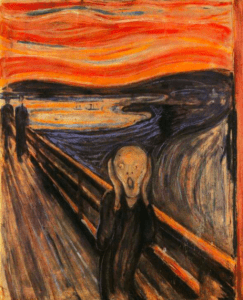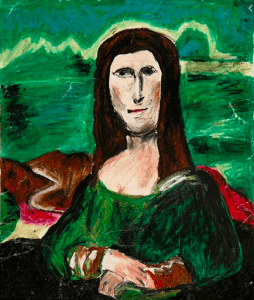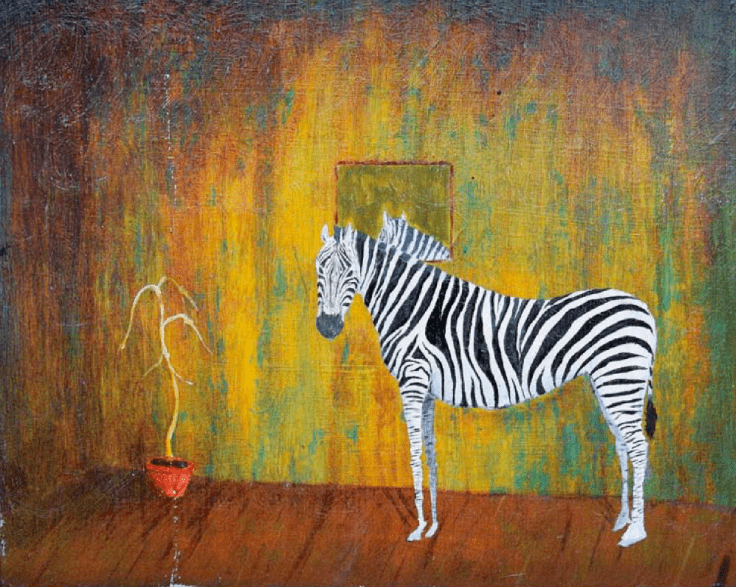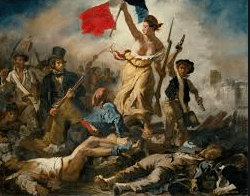Covid-19 and the isolation which has resulted from this global shock has provided the majority of us with unprecedented amounts of free time. Curiously, despite not being an ‘artistic person’ this period of conflict has resulted in me feeling somewhat guilty for not translating this time into an artistic endeavour. Breaking down these feelings has led to some interesting questions for me surrounding the origin of ‘art’ and the nature of being creative in our current society.

The Scream very clearly shows an instance of art being utilised as means of unpacking an emotional conflict
My general failure to commit to an artistic attempt leads me to believe that I am simply not an artistic person, yet my feeling of obligation to turn this isolation period into something tangible has resulted in me questioning what constitutes an artistic person at all. Are only a lucky select few of us who are able to draw and paint ‘artistic?’ Or is there a more inherent drive to create which allows us to be considered an artist of some sort? If there is, it is no doubt showing itself whilst we’re stuck in isolation. I suspect that the desire to create art right now is a byproduct of free time combined with conflict, which has created a kind of stagnant confusion which we’d like to work through somehow. So why are some of us so dubious about the validity of making our own art at this time? The feeling of being obligated to create art in order to specifically break down an issue initially seemed to me dangerously near to reducing the authenticity of an artistic response. However, this is no doubt what humanity has always done: responded to conflict through self-expression (as is shown through Liberty Leading the People, and The Scream). So why do I feel this way? Perhaps it is the societal context that this particular conflict is occurring in which is muddling my perception of creativity and art.
In this environment of hyper-awareness of how we respond to change, and of an increasingly critical eye concerning validity and appropriateness, it is easy to feel unworthy of adding our imperfect interpretations to the mass of seemingly perfect artworks. This leads naturally to the dilemma of ‘art for art’s sake.’ My failure to actually attempt any art in isolation reflects that for the ‘unskilled’ we may very much have rejected ‘art for arts sake’ due to our increased exposure to ‘good’ art resulting in us losing confidence in the value of our own ‘not-so-good’ art.

Despite this art being considered “bad,” does that actually mean anything surrounding its value to the artist?
This way of thinking is also strangely rooted in the idea that art should always be ‘good’ by external standards, and that art is for others, rather than purely for ourselves. Our strongly capitalist society has brought us up with the idea that everything we produce must have a purpose or be financially beneficial; therefore, ruining any desire to create very poor art simply to unpack ones feelings on a matter. Therefore, whilst isolation may drag up a few buried artistic inclinations, my flawed conception of what is valuable and worth my time keeps me trapped in a loop of doubting my art and not starting anything.
Whilst this post fails to remedy this issue and my masterpiece remains un-started, it is interesting to break down and interrogate art in this time, particularly from the perspective of someone non-artistic. However, my experience may not be widely felt, so if you’ve had a completely different relationship with art in quarantine, let me know!






I loved reading this – it was incredibly well-written and engaging.
I also really related to a lot of what you spoke about; I don’t consider myself artistic at all, and I find myself trapped up in bouts of guilt for it.
It led to a lot of thinking of my own, and I wonder whether this drive is genuinely spurred by the societal context or as it seems like a traditional way to cope? Do we all have a desire within us to create something, or do we follow the pack?
The point you made about capitalism influencing how we perceive the purpose of art is also brilliant. I’ve never considered it this way before, but it makes perfect sense. I’ve often been discouraged from pursuing a hobby or skill just because I knew I would start off miles behind. I tended to associate this with my habit of comparing myself to others, but never contemplated the roots of this way of thinking.
It’s unfortunate that we approach things in this way. So many brilliant people are held off from pursuing things they might be wonderful at, but they simply never try for fear of doing badly.
I suppose it takes a certain level of courage, and vulnerability, to create things that you know are not perfect, but mean something great to you.
This was honestly quite encouraging – it’s good to know I’m not alone in my unartistic ways.
I wish you luck in creating your ‘not-so-good’ lockdown masterpiece and loving it!
I agree with a lot of what this post says about how people today think about art and artistic endeavours. I myself love to draw and use art as a sort of therapy, but during this quarantine what little I have been able to produce hasn’t felt ‘good enough’ or worth my time.
I feel like part of the problem of having to be ‘worthy’ like you mentioned comes from the amount of exposure we as humans have to the rest of the world. All of a sudden, everything we do, say, eat, and create becomes something that others can criticise and judge. From that, there is an expectation that what you put out into the world is perfect and polished. There is little room for learning, no space for mistakes. Even modern art gets a side eye and the obligatory “A toddler could do that!” comment.
Online, the idea of cringe culture surrounding original characters created by budding artists and writers can be highly detrimental to the growth and self-worth of those people. From a professional view there is something to be said about quality of content, but what has been forgotten is that not everything has to be professional.
One of my favourite youtubers right now is Rachel Oates. She struggles with anxiety and depression and has been recently using art as a method to categorise her emotions and turn them into something fun rather than destructive. Her paintings aren’t impressive through a critical lens, but they don’t have to be. They are what she enjoys making, and that is amazing. It is okay to not have mastered a craft before showing it to others. It is okay to not show others at all. The beauty of art is that it is whatever you want it to be (thanks post-modernism!), regardless of skill level or time spent.
You are very right about how people tend to think that if art is not ‘good’, then it shouldn’t be made. There does need to be a shift in attitude to say that we can not be the top in a field, and still enjoy the craft. There also shouldn’t be pressure to become a ‘good artist’. Humans are creative, through many different facets. There is no ‘failure’ in being creative, despite what some believe. Everyone has the ability to participate in some way. Start small, and just throw things together and see what sticks for you.
I also raise you Ingres, the professional painter and his terrible anatomy. ‘Grande Odalisque’ and ‘Mademoiselle Caroline Rivière’ are something else.
If he can be praised as a ‘good’ artist, then the sky is the limit.
I completely agree. It’s a strange time we’re living in, and I find myself turning to art as a way to express the tumultuous emotions that I have, however I am also a perfectionist… not a good mix. I think the reason why we feel as though art has to be perfect is that we feel like we need to contribute something to society – why bother making art if it isn’t ‘good enough’ for others to profit from (that seems to be an idea that people subconsciously grapple with when creating art). I love making really crappy art, because it’s a small and insignificant way of rebelling against that part of myself as well as the industrial mindset of many around us. I love creating stuff that looks absolutely terrible, laughing at it, and then screwing it up and throwing it in the bin. If it makes us slightly happier for a while, is that not it’s purpose?
I can’t help but be reminded of a theory in A.I. safety research, the orthogonality principle. The gist is that as an A.I. gets smarter it won’t natural gravitate towards any specific goal, and likewise giving an A.I. a particular goal doesn’t change how smart it is. An A.I.’s goal and it’s skill are ‘orthogonal’ i.e. completely separate from each other. We humans are A.I.s without the ‘A’ for ‘Artificial’. We have goals, and entirely separately, we have our intelligence and talents. If we view art as a display of intelligence (which is a reductionist oversimplification, but hear me out) then it should be entirely unrelated to our goals and motivations. So even if we have more reason to create art in times of crisis, the art that we make as a show of skill, is on an entirely different (orthogonal) axis. Good art and bad art is down to how you make it, not why.
If art is not about skill and appreciation, and it’s a goal in of itself, then that’s the other side of the orthogonality principle coin: it’s unrelated to the skill and talent that goes into it.
Having successfully misinterpreted and misapplied the life’s work of many A.I. safety researchers, let me get to the motivational bit.
Your art will not start good, and neither did Van Gogh’s, nor Shakespeare’s, nor Luis Fonzi’s. It’s still art, and it still has value, even if only something you use to practise. If you hate what you make and light it on fire, you presumably know why you hate it and can do it a little better next time. If you believe the stereotypes, you already have the first prerequisite to becoming an artist, self-doubt.
Well, don’t believe the stereotypes, don’t doubt yourself, and make whatever you want to, whether or not you think it’ll turn into something good. And if you don’t want to make anything, then by extension you don’t need to make anything.
I haven’t written any good poems lately. Maybe that would be more productive than recreational programming, looking up obsolete pronouns on wikipedia or learning about the practical applications of tarot cards, but it’s my free time, and I’m not going to let external standards about art get in the way of what I want. Those things make me happy, and in isolation, the real art is staying sane.
For myself, I would not say that I am artistically talented but nonetheless, I very much enjoy times when I let myself demonstrate imperfect creativity. When I look at a piece of art that seems so perfect, it can seem daunting to be artistic in my own way, yet I know the artist would often argue that there was so much that could have been done to better it – they’d just gotten tired of making the minute changes.
Even more than creating art at this time, I’ve actually become fascinated with viewing the world around me as art. This lockdown has got me going on more walks just for the pure joy of it, and in this break from staring at screens, there comes an appreciation of nature and little pockets of my neighbourhood (a welcome change from walls and windows looking at the neighbours’ houses).
What I found really interesting about your article was the way you mentioned that humanity has always responded to conflict through self-expression. The way that they were not so consumed with perfection that the artists were able to create masterpieces – artistic creations that are considered so amazing partly because of the way that the response to conflict, the artist’s emotions, thoughts, and perspective of their context, is displayed. The painter that comes to mind, and whose artwork you have included in your post, is Jacques-Louis David, who painted revolutionary artwork in the French Revolution of 1789. He was involved in fighting against the monarchy by way of his art, yet was also named First Painter to Napoleon Bonaparte in 1801, which I find quite interesting as Napoleon then assumed an authoritarian rule much like the one that David and many others were fighting against. Art is certainly an integral part of conflict – whether through paintings, cartoons, or even photography or the art of writing. Art is such a packed form of media open to interpretation and bursting with meaning. No wonder it’s such a valued form of self-expression!
“Art” is a surprisingly ambiguous term. This article has brought up the interesting point of defining “art”. You say that “this post fails to remedy this issue and [your] masterpiece remains un-started”, but I challenge that. This post IS a form of art, as is exercise, math, reflection and so many other acts.
Why do we insist on this “artistic vs non-artistic” rhetoric when in actual fact, we are only defining this based on our personal opinion of what art actually is.
If dance is an art, why is boxing not? Both are a control and skillful use of certain muscles in a very specific way, so what sets them apart?
If poems are art, why is the skillful creation of a blog post not considered such too?
I would argue that all of you here feeling untalented or un-artistic are mistaken, you are just as artistic as a musician, only in different ways.
This post’s ideas around the Capitalist context of art making us ashamed of anything we believe inadequate has given me cause to examine my own sporadic forays into artistic endeavour.
The sporadic nature of these forays is due to my drive to create being very occasional – being based on either a need (such as my new profile picture) or finding a new shiny (such as playing with Blender). Perhaps, if I could see some value in my endeavours beyond this (see money), I would invest more time in getting better at arting and, perhaps, get sufficiently good at it to see some value in it.
Hmm, I see a problem but, cannot quite see a capital value in solving it.